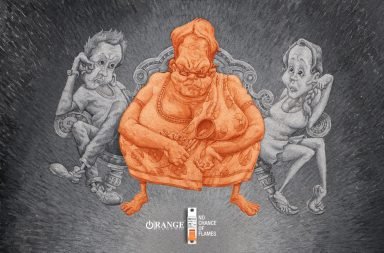I still cannot remember my first time I ever clicked on a banner advertisement on the Internet. Well, the thing is I don’t remember most of the advertising I see on the Internet let alone click on it. And, I bet that is probably the same thing for a lot of you and I think that’s a problem.
Does anybody know what is the first ever banner ad that was ever on the Internet? It was a website called hot-wired now it’s called Wired magazine.
 Here’s what the first banner ad looked like (HotWired/AT&T)
Here’s what the first banner ad looked like (HotWired/AT&T)
Believe it or not the probability of clicking on a banner is ad is higher than getting hit by lightning.

Kodak you might have heard of them that little photography company that had the patents for digital photography and sat on them for about 20 years and are currently being disrupted out of business it is a sad tale but I kind of learned disruption firsthand that way. So I thought it would be interesting to look at a couple of other companies to see if the past can teach us something about the present in the future.
 This is Wikipedia in 1874, alright look how far it’s come from from way back then to today.
This is Wikipedia in 1874, alright look how far it’s come from from way back then to today.
 This is the iPad in 1955.
This is the iPad in 1955.
When people tell you that being digital is antisocial because you are all head down, refer them to this thing. It is human behavior it has nothing to do with digital technology. It is just the way we are, right!
 This is WhatsApp in 1944 and if they were eating the notes it would be Snapchat.
This is WhatsApp in 1944 and if they were eating the notes it would be Snapchat.

This is the New York Times in 1996 in that time – two little banner ads.

This is the New York Times in 2014 that’s the advertising – one big banner ad.
Where we are, it is where we are.
It is hilarious but terrifying, there are 200 million people a month using an ad blocker. There is nothing subtle about this number it is 200 million people going “No thank you I don’t want this stuff”.
How many of you use an ad blocker? A quarter of the traffic has ad blockers installed on more technical websites or youth web sites that number climbs over 30, 35, 40 % that’s 40% of the business that just disappears.

In the advertising and marketing business, ad blocker is related to the rules of Fight Club. The first rule of ad blocker is you do not talk about ad blocker, the second rule of ad blocker is you do not talk about ad blocker.
I mean it’s pretty easy right. Why not, why wouldn’t you, if more people learn about this stuff the more they want to use it because what they get in return is normally crap right.
Talking about flow and happiness and this idea of flow is a state that you get in when you are in the zone where, you are feeling like you know that things are going your way. And, on the internet, you can feel that way when you are involved in something that you like when you’re watching a video that you love or reading an article or doing something funny, and advertising today gets in your way, pop-up ads, inescapable video ads. These things that block the flow is contradictory to the idea of having a memorable and pleasurable experience online and that is a fundamental problem with the business that they are in.
Now, people hate this stuff and they hate the fact that advertising costs the money. If you are on mobile with a fixed contract it costs you money to download people’s advertisements and it also costs you time, two things that we are kind of hard-pressed for these days. In Germany and Austria there is a heightened sense of personal data and data protection and that gets in the way and promotes this idea of why one should use an ad blocker.
 I mean these are the only cookies, third party cookies especially, I think people really want as opposed to being tracked across the internet from 60,000 sources that they have no idea who is doing it. And, mobile will be huge right it’s sixty percent of the traffic in the United States 60/40 desktop 60/40 mobile to desktop. In Europe and in Austria it is about 50/50 and it is growing and at the moment I cannot think of a single decent business model other than some of what Facebook is doing with their little advertising, but normal banner ads on mobile suck right.
I mean these are the only cookies, third party cookies especially, I think people really want as opposed to being tracked across the internet from 60,000 sources that they have no idea who is doing it. And, mobile will be huge right it’s sixty percent of the traffic in the United States 60/40 desktop 60/40 mobile to desktop. In Europe and in Austria it is about 50/50 and it is growing and at the moment I cannot think of a single decent business model other than some of what Facebook is doing with their little advertising, but normal banner ads on mobile suck right.
What when you click on them? Normally it’s an accident. All right how many of you have accidentally clicked on a mobile ad with your thumb and you are like back back back back back, right? We have invented an accidental business model and it’s not sustainable. People talk about the digital revolution I think it is an apocalypse I think we have created an environment that is unsustainable and something needs to change and so it got me what if there was no advertising wouldn’t it be nice.

 You step out, it doesn’t get your way anymore. You look right through it doesn’t get your way. You are off for a walk you don’t get attacked. The spaces are empty the architecture shines through and things are just fine white spaces your days are clear everything is just fine.
You step out, it doesn’t get your way anymore. You look right through it doesn’t get your way. You are off for a walk you don’t get attacked. The spaces are empty the architecture shines through and things are just fine white spaces your days are clear everything is just fine.
 Times Square changed altogether right. So beautiful.
Times Square changed altogether right. So beautiful.
 The Washington Post no more advertising pestering you.
The Washington Post no more advertising pestering you.
 Websites that have more advertising than content suddenly become usable again.
Websites that have more advertising than content suddenly become usable again.

And, YouTube without free rolls or without advertising wouldn’t that be nice?
I mean look at this can you figure out where the content is?
Here is another one.
I wonder where are we? what have we become?
But, if we get rid of it, if we get rid of it all what really happens.
This is snowfall from the New York , it won the Pulitzer Prize a few years ago it’s a brilliant piece of work. It told the story of a skiing accident a tragedy actually, but in a way that no one had ever really seen before, videos interviews, info-graphics, a beautiful piece of work.
It told the story of a skiing accident a tragedy actually, but in a way that no one had ever really seen before, videos interviews, info-graphics, a beautiful piece of work.
This is the NSA decoded on the Guardian. It was such an approachable piece of work. Videos, info-graphics, interviews with people, text images an incredible amount of work went into making an incredibly complex story something very approachable.
It was such an approachable piece of work. Videos, info-graphics, interviews with people, text images an incredible amount of work went into making an incredibly complex story something very approachable.
A fantastic thing it got me closer to this issue it brought me an understanding, what would happen if the advertising is gone? What happens to the social networks that we all rely on most of whom are ad funded today? What happens to the fun stuff what happens to the cats and the night shows that we like if we can’t find a way of paying for it, if we can’t fund the Internet in a way that makes enough money for people who do it, but then doesn’t piss you all off too much.
There’s a company in Austria that figured out that telling stories was much more fun than doing advertising, Works! based on what Plato said 400 BC “Those who tell the stories rule the society.”
Millions of people enjoyed this story told by a brand or Chris Davenport a skier about what it’s like to be in Alaska or in South America.
So, there are ways to do it. You just have to look. But, what can you do what if you could help fix this right. What happens if the next time you went to Wikipedia and saw a Jimmy Wales mug on the internet and Jimmy was asking you for five euros.
 What would happen if you gave Wikipedia five euros, next time they would run fun drives of a year, they need it. Our kids use it, I use it you all probably use it on a daily basis what if we gave them five euros.
What would happen if you gave Wikipedia five euros, next time they would run fun drives of a year, they need it. Our kids use it, I use it you all probably use it on a daily basis what if we gave them five euros.
What if Mariya Popova over on brain pickings for example. It is inspiring its daily it is a lot of work and it’s funded by donations. Now, people reaching out and saying if you love what I do please help us do it, and I think that is a much better way of doing this.
It is inspiring its daily it is a lot of work and it’s funded by donations. Now, people reaching out and saying if you love what I do please help us do it, and I think that is a much better way of doing this.
Standard, for example. That has this idea of fair use where you can get rid of the ads if you’re willing to pay for stuff. And if you are not willing to pay for stuff they say please let us show you the ads. It is kind of a fair arrangement certainly better than some of the stuff that is going on today.
That has this idea of fair use where you can get rid of the ads if you’re willing to pay for stuff. And if you are not willing to pay for stuff they say please let us show you the ads. It is kind of a fair arrangement certainly better than some of the stuff that is going on today.
If any of you have the ability I like to kind of look at it like the iceberg, 10% is the part that you see it is the tip of the iceberg. What would happen if 10% of your budgets if you found a way of clawing that back and telling stories that meant something to people instead of putting advertising in front of and being more authentic and saying things that people would want to hear as opposed to just being posters in some places. Think about it.


